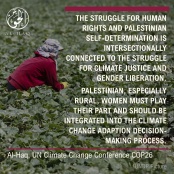This brief is part of a series on climate change, its adverse effects and the Israeli colonial-apartheid regime, published in the context of the UN Climate Change Conference COP26.
Date: 9 November 2021
Confronted with a protracted situation of colonial occupation, with an ever-entrenching apartheid regime, Palestinian women and girls suffer Israel’s oppression in a more accute manner than Palestinian men. Studies suggest that women and girls are more vulnerable to climate change-related hazards, especially floods, droughts and heatwaves.[1] Amongst the determining factors that contribute to such vulnerabilities, include women’s unique nutritional needs, making them more sensitive to agriculture and food insecurity, difficulties to adapt their traditional dress codes in case of climactic episodes.[2]
Palestinian women hold a central productive, reproductive and community-managing role within Palestinian households, being the main care provider for children, the elderly, the disabled and the sick, and carrying essential responsibilities in terms of resources, food and water, provision, and house maintenance.[3] They will be more strongly impacted by the adverse effects of climate change in terms of water shortages, agricultural severance, and resource exhaustion. Amongst the gender-related “highly vulnerable” issues, the Palestinian Authority’s National Adaptation Plan to Climate Change cites the likelihood of spreading water-related diseases amongst families,[4] the increasing level of food insecurity - identified as 17 percent higher amongst female-headed households than male-headed households in the Gaza Strip.[5] Furthermore, climate sensitivity is another concern affecting female employment in the Gaza Strip; of the 14.6 percent of employed women, mostly non-refugee women, a great deal of them work in the agriculture sector, often having to carry out tasks traditionally allotted to men due to Israel’s occupation, making them more vulnerable to climate related hazards.[6]
As the Occupying Power of the Palestinian territory, Israel is obliged to respect international human rights law and customs, especially the Convention on the Elimination of All Forms of Discrimination Against Women (CEDAW).[7] Israel’s overall apartheid and colonial regime imposed on the Palestinian people and their lands is based on a combination of discriminatory inhuamn acts aimed at entrenching domination over the Palestinian people as a whole, with the effect of reinforcing climate change oppression. Palestinian women and girls suffer in an aggravated manner, the impacts of climate oppression on their rights, in particular their right to “enjoy adequate living conditions, particularly in relation to housing, sanitation, electricity and water supply [...]” as per Article 14(h) of the CEDAW.
Because the struggle for human rights and Palestinian self-determination is intersectionally connected to the struggle for climate justice and gender liberation, Palestinian, especially rural, women must play their part and should be integrated into the climate change adaption decision-making process. This is particularly important when it comes to measures related to water and sanitation, and support of women-led community-based agricultural projects.
Read Al-Haq’s case study on the gender dimensions of Israel’s coercive environment in the Jordan Valley here.
[1] See WHO, Gender, Climate Change and Health (2014), https://apps.who.int/iris/bitstream/handle/10665/144781/9789241508186_eng.pdf
[2] See WHO, Gender, Climate Change and Health (2014), https://apps.who.int/iris/bitstream/handle/10665/144781/9789241508186_eng.pdf
[3] See Suha Jarrar, “Unpacking Gender in Coercive Environments: The Case of the Jordan Valley,” (Al-Haq, 2014), https://www.alhaq.org/cached_uploads/download/alhaq_files/publications/UnpackingGenderinCoerciveEnvironmentsTheCaseoftheJordanValley.pdf
[4] State of Palestine, National Adaptation Plan (NAP) to Climate Change (2016), 31, https://unfccc.int/files/national_reports/non-annex_i_parties/application/pdf/national_adaptation_plan__state_of_palestine.pdf
[5] State of Palestine, National Adaptation Plan (NAP) to Climate Change (2016), 32, https://unfccc.int/files/national_reports/non-annex_i_parties/application/pdf/national_adaptation_plan__state_of_palestine.pdf
[6] State of Palestine, National Adaptation Plan (NAP) to Climate Change (2016), 32, https://unfccc.int/files/national_reports/non-annex_i_parties/application/pdf/national_adaptation_plan__state_of_palestine.pdf
[7] Israel signed the CEDAW on 17 July 1980, and ratified on 3 October 1991, see United Nations Human Rights, “Ratification Status for Israel,” https://tbinternet.ohchr.org/_layouts/15/TreatyBodyExternal/Treaty.aspx?CountryID=84&Lang=EN


